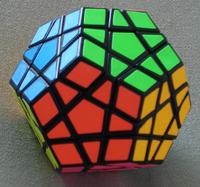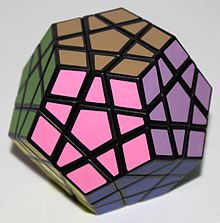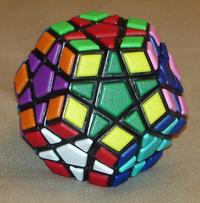This is an old revision of this page, as edited by 2601:cd:4101:5520:b013:d632:7866:8f01 (talk) at 22:36, 20 May 2022 (I made another quick change to the list). The present address (URL) is a permanent link to this revision, which may differ significantly from the current revision.
Revision as of 22:36, 20 May 2022 by 2601:cd:4101:5520:b013:d632:7866:8f01 (talk) (I made another quick change to the list)(diff) ← Previous revision | Latest revision (diff) | Newer revision → (diff) Puzzle


The Megaminx or Mégaminx (/ˈmɛɡəmɪŋks/, /ˈmeɪ-/) is a dodecahedron-shaped puzzle similar to the Rubik's Cube. It has a total of 50 movable pieces to rearrange, compared to the 20 movable pieces of the Rubik's Cube.
History
The Megaminx, or Magic Dodecahedron, was invented by several people independently and produced by several different manufacturers with slightly different designs. Uwe Mèffert eventually bought the rights to some of the patents and continues to sell it in his puzzle shop under the Megaminx moniker. It is also known by the name Hungarian Supernova, invented by Dr. Cristoph Bandelow. His version came out first, shortly followed by Meffert's Megaminx. The proportions of the two puzzles are slightly different.
Description
The Megaminx is made in the shape of a dodecahedron, and has 12 faces and center pieces, 20 corner pieces, and 30 edge pieces. The face centers each have a single color, which identifies the color of that face in the solved state. The edge pieces have two colors, and the corner pieces have three. Each face contains a center piece, 5 corner pieces and 5 edge pieces. The corner and edge pieces are shared with adjacent faces. The face centers can only rotate in place, but the other pieces can be permuted by twisting the face layer around the face center.
There are two main versions of the Megaminx: one with 6 colors, with opposite faces having the same color, and one with 12 different colors. The 12-color Megaminx is the only type legal in official WCA competitions, and is therefore much more popular than the 6-color version.
The objective of the puzzle is to scramble the colors, and then restore it to its original state of having one color per face.
Solutions
The 6-color Megaminx comes with an additional challenge which is not immediately obvious (and which does not occur on the 12-color puzzle). Its edge pieces come in visually identical pairs, because of the duplicated colors of opposite faces. However, although visually indistinguishable, they are nevertheless mathematically bound in a parity relationship. In any legal position (reachable from the solved state without disassembling the puzzle), there is always an even number of swapped pairs of edges. However, since swaps may be between visually identical edges, one may find that having solved almost the entire puzzle, one is left with a pair of swapped (distinct) edges that seems to defy all attempts to exchange them. The solution is to swap a single pair of 'identical' edges to resolve the parity issue, and then restore the rest of the puzzle.
This property is absent in the 12-color Megaminx, because all its edges are distinguishable, and it would be immediately obvious that there is another pair of swapped edges besides the pair one is working with.
Variations
There are many similar puzzles with different numbers of layers, most of which change the "mega" in the puzzle's name to another metric prefix. They are the Kilominx (2 layers), Master Kilominx (4 layers), Gigaminx (5 layers), Elite Kilominx (6 layers), Teraminx (7 layers), Royal Kilominx (8 layers), Petaminx (9 layers), Emperor Kilominx (10 layers), Examinx (11 layers), Zettaminx (13 layers), Yottaminx (15 layers), Eurominx (17 layers), and Atlasminx (19 layers). The highest order mass-produced variant of the Megaminx is the Zettaminx, which was released by ShengShou at the middle of September 2021, and the highest order variant of the Megaminx ever made to date is the Minx of Madness, created by Corenpuzzle using 3D printing. The Minx of Madness was revealed in May 2022. It is the dodecahedral equivalent to a 21x21x21 Rubik's cube.
Alexander's Star is equivalent to solving only the edges of a six-color Megaminx.
The Impossiball and Kilominx are equivalent to solving only the corners of a Megaminx, but are very different mechanically. The Impossiball is available with either six or twelve colors.
The Pyraminx Crystal is a modified Megaminx with deeper turning planes.
Tony Fisher has produced a shape modification of the Megaminx into a cube form which he called the Hexaminx. Another variant is the Holey Megaminx, which has no center pieces, like the Void Cube. It is being produced by Mèffert as of July 2009. Other variants include the Flowerminx, Megaminx Ball, and Crazy Megaminx.
-
 A Holey Megaminx, with black body
A Holey Megaminx, with black body
-
 Kilominx, Megaminx, Master Kilominx, Gigaminx, Elite Kilominx, Teraminx
Kilominx, Megaminx, Master Kilominx, Gigaminx, Elite Kilominx, Teraminx
Number of combinations
Both versions of the Megaminx have 20 corners and 30 edges. In both cases, only even permutations are possible, regardless of the position of the other set of pieces. Thus, while it is possible to have a single pair of corners and a single pair of edges swapped on a Rubik's Cube, this is impossible on the Megaminx. There are 20!/2 ways to arrange the corners and 3 ways to orient them, since the orientation of the last corner depends on that of the preceding ones. There are 30!/2 ways to arrange the edges and 2 ways to flip them.
The full number is 100 669 616 553 523 347 122 516 032 313 645 505 168 688 116 411 019 768 627 200 000 000 000 (roughly 101 unvigintillion on the short scale or 101 undecillion on the long scale).
The corners are distinguishable on a 6-color Megaminx because two corners with the same three colors will be mirror images of each other. There are 15 pairs of identical edges. It would not be possible to swap all 15 pairs, since this would be an odd permutation of the edges, so a reducing factor of 2 is applied to the preceding figure.
The full number is 6 144 385 775 971 883 979 645 753 925 393 402 415 081 061 792 664 780 800 000 000 000 (roughly 6.1 vigintillion on the short scale or 6.1 decilliard on the long scale).
For the larger size variations (gigaminx, teraminx, petaminx etc.), the general number of combinations is where respectively for megaminx, gigaminx, teraminx, petaminx, etc. The number of combinations evaluates to for gigaminx, for teraminx, for petaminx, for examinx, for zettaminx, for yottaminx, etc.
Records

The world record time for a Megaminx solve is 27.22 seconds, set by Juan Pablo Huanqui of Peru on 21 December 2019 at La Tienda Cubera Christmas 2019, in Lima, Peru.
The world record average of five solves (excluding best and worst) is 30.39 seconds, also set by Huanqui on 11 August 2019 at Wuxi Open 2019 in Wuxi, Jiangsu, China, with the times of 30.12, (28.50), (31.19), 29.97, and 31.07 seconds.
Top 5 solvers by single solve
| Name | Fastest solve | Competition |
|---|---|---|
| Juan Pablo Huanqui | 25.24s | Lima Cuberano 2022 |
| Leandro Martín López | 28.64s | Argentina ReOpen 2021 |
| Amos Nordman | 28.84s | Helsinki Open 2020 |
| Magdalena Pabisz | 28.94s | Dragon Cubing 2021 |
| Nicolas Naing | 29.22s | CubingUSA Nationals 2019 |
Top 5 solvers by average of 5 solves
| Name | Fastest average | Competition | Times |
|---|---|---|---|
| Juan Pablo Huanqui | 30.39s | Wuxi Open 2019 | 30.12, (28.50), (31.19), 29.97, 31.07 |
| Leandro Martín López | 31.99s | Argentina ReOpen 2021 | (28.64), (37.14), 33.22, 30.96, 31.78 |
| Yu Da-Hyun (유다현) | 32.03s | CWR Winter 2018 | 30.94, 31.24, (35.78), (30.12), 33.90 |
| Nicolas Naing | 32.42s | Empire State Winter A 2022 | 33.72, (34.52), 30.54, 32.99, (28.19) |
| Amos Nordman | 32.48s | Minx C-Open-hagen 2020 | 31.53, 32.84, (36.09), (30.84), 33.06 |
See also
- Impossiball
- Alexander's Star
- Pyraminx Crystal
- Pocket Cube
- Rubik's Cube
- Rubik's Revenge
- Professor's Cube
- V-Cube 6
- V-Cube 7
- V-Cube 8
- Pyraminx
- Skewb Diamond
- Tuttminx
- Dogic
- Combination puzzles
- Magic 120-cell
References
- Jaap's puzzle page, Megaminx
- twistypuzzles.com, Hungarian Supernova
- Gigaminx and Teraminx Archived 2009-06-06 at the Wayback Machine (in Italian)
- Video of Petaminx
- Video of The Atlasminx
- "Minx Of Madness (World Record)". Retrieved 2022-05-13.
- Slocum, Jerry (2009), The Cube: The Ultimate Guide to the World’s Best Selling Puzzles. Black Dog & Leventhal Publishers. ISBN 978-1-57912-805-0.
- Generalized number of permutations for all twisty puzzles. Search the page for Megaminx.
- ^ World Cube Association Official Results - Megaminx
- World Cube Association Official Megaminx Ranking Single
- World Cube Association Official Megaminx Ranking Average
External links
- Meffert's puzzle shop
- Jaap's Megaminx page—contains solutions and other information
| Rubik's Cube | |||||||||||||||
|---|---|---|---|---|---|---|---|---|---|---|---|---|---|---|---|
| Puzzle inventors | |||||||||||||||
| Rubik's Cubes | |||||||||||||||
| Variations of the Rubik's Cube | |||||||||||||||
| Other cubic combination puzzles | |||||||||||||||
| Non-cubic combination puzzles |
| ||||||||||||||
| Virtual combination puzzles (>3D) | |||||||||||||||
| Derivatives | |||||||||||||||
| Renowned solvers |
| ||||||||||||||
| Solutions |
| ||||||||||||||
| Mathematics | |||||||||||||||
| Official organization | |||||||||||||||
| Related articles | |||||||||||||||
 The full number is 100 669 616 553 523 347 122 516 032 313 645 505 168 688 116 411 019 768 627 200 000 000 000 (roughly 101 unvigintillion on the
The full number is 100 669 616 553 523 347 122 516 032 313 645 505 168 688 116 411 019 768 627 200 000 000 000 (roughly 101 unvigintillion on the 
 where
where  respectively for megaminx, gigaminx, teraminx, petaminx, etc. The number of combinations evaluates to
respectively for megaminx, gigaminx, teraminx, petaminx, etc. The number of combinations evaluates to  for gigaminx,
for gigaminx,  for teraminx,
for teraminx,  for petaminx,
for petaminx,  for examinx,
for examinx,  for zettaminx,
for zettaminx,  for yottaminx, etc.
for yottaminx, etc.